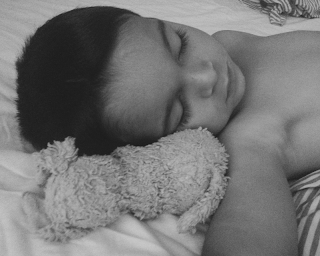Rejecting The Sleep Training Culture, Despite Early Success
Published First on The Motherload, 15.4.18
My confession: we tried sleep training.
Is he sleeping/feeding/crying/playing too much/too little? Like many other first-time clueless parents, coping postpartum with newborn life broke me. The critical effects of the sudden onslaught of sleepless nights, anxious days and sore nips were far worse than I’d romanticised.We soon reached for books preaching routines and promising contentment. We read that feeding/cuddling/rocking to sleep would cause long lasting bad habits. We tried the recommended schedule and my husband took over bedtime duties. After a breastfeed and a story, I’d ninja-step out of there as he'd sashay into the nursing chair. Little one got cuddles galore with his Papa, along with all the rugby anthems he asked for. I never knew that ‘Swing Low, Sweet Chariot’ had so many verses. But after much perseverance, he managed to achieve the impossible: put down in the cot, sleepy, but awake. By the time he was seven months old, he slept for a solid twelve hours a night, cuddling his bunny and humming himself to sleep.
The night-time sleep-training was seemingly successful. People praised us for helping our child to be independent. People joked that he'd already read the manual. We pinned feed and sleep times to the kitchen notice board. We became those well-rested smug-faced parents who thought we’d tamed those pesky sleepless nights forever.
But, what was the price we paid for a full night's sleep?
I'm not sure what our baby thought. But with certainty, I can say that the price was my mental health. I spent the early days feeling useless and anxious, dreading naptimes. Rousing his little sleepy head after a feed seemed completely against my instinct, but the fear of "bad sleep habits" was greater. I've never been much of a worrier, but I developed intense anxiety on trips away and big days out, panicking about his sleep. I became a slave to the schedule and clock, fearing the consequences if we disobeyed.
Even without those books, the pressure to sleep train was everywhere: when he was just four months, sleeping snugly on my shoulder, I opened the door to our Health Visitor who was quick to criticise, “allow him to self-soothe in the cot”. I tried, I really did, but closing the door and ignoring him was far harder than they suggested. Instead, with their warnings rattling around my head, I chose to walk him for every daytime nap, bent over the buggy to hold his hand or stroke his head.
All settled into place, but then our sleep-angel hit the two-year sleep regression. Poor wee lamb. What had we done? Our self-settling self-soother of a hero was suddenly refusing his bed, refusing his bedroom and refusing sleep. Night terrors. We didn't know how to help him. We sought advice from 'professionals': “leave him to cry it out”. The thick cloud of the sleep training dust was finally clearing.
This was total bollocks; we had to do things differently.
Instead, we discarded all the sleep training advice and simply listened to him, kept him close. Long evenings were spent getting to know his new bedtime needs and just being there with him. Friends warned against "making rods for our own back". Blah blah. He's now three and a half. Every night since then, one of us lies with him until he’s fast asleep, storytelling, singing, cuddling, whatever he needs. And these comforts satisfy us, too. Requests for "papa's nook" make us all smile. He rarely wakes up now, but we’re there for him if he does.
Among all the chaos of newly disrupted nights was another little laddie in our family. I decided from the get-go that I’d only trust my instincts. I listened to him and fed him whenever he needed milk, completely liberated from the clock, enjoying every naptime, at home or day-tripping. By bedtime, I'd snuggle, read, sing and feed him to sleep, treasuring the night feeds for this was the only time that he had my undivided attention.
The youngest is now twenty two months and I feel reassured that I understand and respond to his cues. He seems to trust me. Until recently, he's woken up every 2-3 hours; it's now every 5 or 6. It probably sounds horrendous to most, but it’s actually okay. Usually. He wakes up, calls for me and after a little feed, is back to sleep, all within fifteen minutes. Usually. I tell myself that it won’t be like this forever and I remind myself that I’ll miss these nocturnal wake-ups one day. I’ve learnt all the seasonal paths of the moon and I enjoy extra chocolate biscuits with my afternoon tea. Always.
But the sleep training culture is so dominant that I'm regarded as mad for dismissing it, especially as we've succeeded before.
Mention you’re sleep-deprived, perhaps hoping for a little empathy, and you’ll be hit with all the advice promising products, people and routines that will 'correct' your child’s natural sleep patterns, reminding me of our fresh-faced early days. Call me stubborn. Call me a mum who’s “made a rod for my own back”. Call me a martyr (with sarcasm, of course). The truth is, however hard this way is, and it is bloody hard, I’d still do it all over again, choosing fatigue over anxiety. My mental health was too high a price to pay for a full night's sleep. I’ve no idea when little one will sleep through the night, but I do know that for now, despite the yawning, we’re a far happier team, day and night.
#onemorebiscuit #anothercuppaplease #teamnightfeed




Comments
Post a Comment